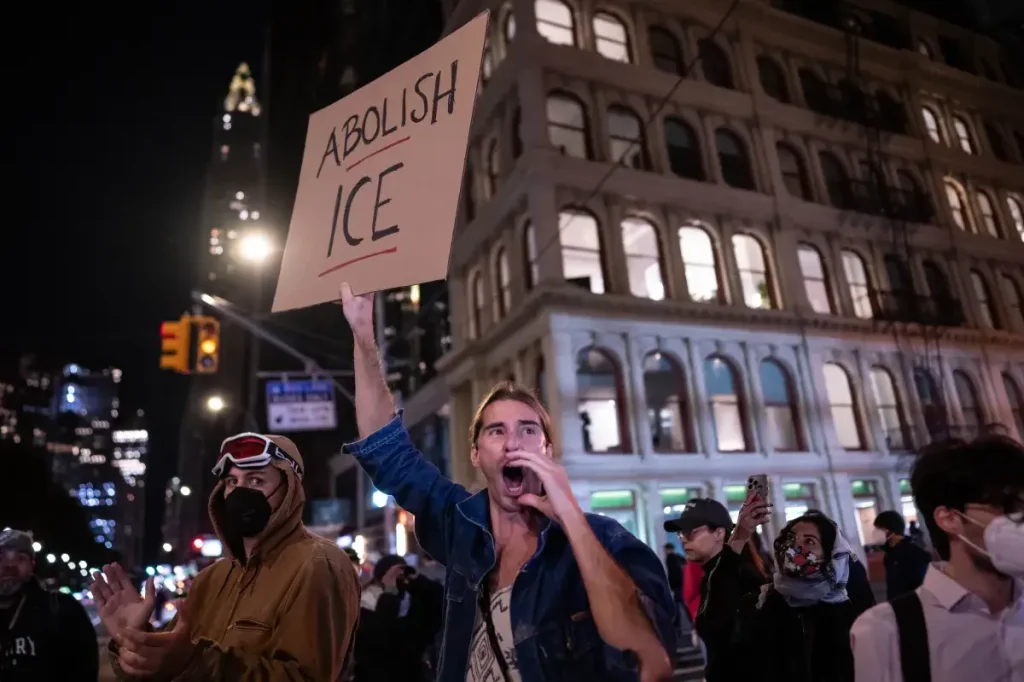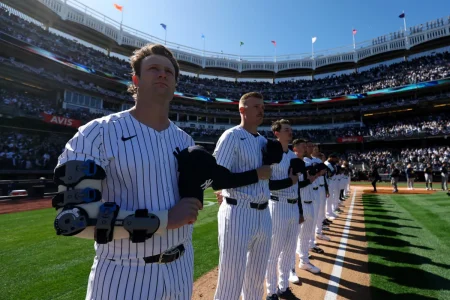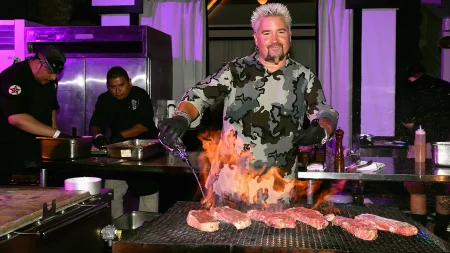Canal Street Raid Ignites Political Firestorm in New York City
In a dramatic confrontation that quickly became emblematic of America’s ongoing immigration debates, federal agents descended on Manhattan’s Canal Street on Tuesday, triggering immediate condemnation from New York’s political leadership. The raid, which targeted street vendors in Lower Manhattan’s Chinatown district, saw agents from multiple federal agencies—including ICE, FBI, ATF, DEA, IRS Criminal Investigation, and Customs and Border Protection—flood the area in what the Department of Homeland Security described as “targeted, intelligence-driven enforcement” against counterfeit goods operations. However, the show of force, which included officers in military fatigues and masks, quickly drew criticism for its aggressive tactics and timing amid heightened national tensions over immigration policy. Videos circulating on social media captured protesters confronting law enforcement, with reports of officers using batons and pepper spray against vendors and bystanders, resulting in at least one arrest for allegedly assaulting a federal officer.
The raid immediately became a flashpoint in New York City’s mayoral race, with candidate and former Governor Andrew Cuomo forcefully condemning the operation as “an abuse of federal power by the Trump administration.” Taking to social media, Cuomo framed the incident as being “more about fear than justice, more about politics than safety,” and declared that such actions ran counter to New York’s core identity as a city built by immigrants. “This is not who we are, and it will never be NYC when I am mayor,” Cuomo asserted, invoking the Statue of Liberty as a symbol of the city’s values and America’s promise. His stance reflected broader Democratic opposition to what many viewed as unnecessarily aggressive federal intervention in a sanctuary city that has historically limited cooperation with federal immigration enforcement.
New York’s current leadership joined in denouncing the operation, with Governor Kathy Hochul directly challenging former President Trump’s claims of targeting the “worst of the worst,” instead characterizing the raid as an attack on ordinary New Yorkers. Mayor Eric Adams emphasized the city’s non-cooperation policy regarding federal civil deportations, stating that “undocumented New Yorkers trying to pursue their American Dreams should not be the target of law enforcement.” Fellow mayoral candidate Zohran Mamdani similarly condemned what he called “authoritarian theatrics” designed to create fear rather than enhance safety. This chorus of criticism highlighted the deep political divisions surrounding immigration enforcement and the tension between federal authority and local governance in sanctuary jurisdictions like New York City.
The Canal Street operation represents far more than a routine law enforcement action; it embodies the intensifying national debate over immigration policy, civil liberties, and the proper boundaries of federal power. The public nature of the raid—conducted in one of the city’s busiest commercial districts in broad daylight—seemed calculated to send a message, occurring against the backdrop of increasingly polarized rhetoric around immigration enforcement nationally. For many New Yorkers, particularly those in immigrant communities, the sight of federal agents conducting sweeps evoked fears of broader crackdowns and raised questions about whether vendors selling counterfeit goods warranted such an overwhelming response from multiple federal agencies. The raid’s timing also sparked speculation about political motivations, given its occurrence during a heated mayoral race in which immigration and public safety are central issues.
The incident has reopened fundamental questions about New York’s identity and values as a city historically shaped by generations of immigrants. The invocation of the Statue of Liberty by political leaders was no mere rhetorical flourish but a reminder of the city’s self-conception as a gateway for newcomers and a place of opportunity. This symbolism stands in stark contrast to the images of federal agents conducting raids in immigrant-dense neighborhoods. The fallout from the Canal Street operation has reinvigorated debate over sanctuary policies, which limit local cooperation with federal immigration authorities. These policies, implemented in numerous cities nationwide, reflect local determinations that community safety is best served when undocumented residents can interact with local services, including law enforcement, without fear of deportation. The raid challenges these local priorities by asserting federal prerogatives in ways that local leaders view as counterproductive to community trust and safety.
Looking forward, the Canal Street raid will likely have lasting implications for federal-local relations and immigration enforcement approaches. The incident has already catalyzed renewed examination of the appropriate boundaries between federal and local authority, particularly in sanctuary jurisdictions. For New York’s mayoral candidates, the raid presents both a challenge and opportunity to articulate visions for how the city should navigate these tensions going forward. Meanwhile, immigrant communities and their advocates will be watching closely for signs of either escalation or retreat in federal enforcement tactics. The broader political impact remains uncertain, but the vivid images of federal agents confronting vendors and protesters in the heart of one of America’s most diverse cities have already become powerful symbols in ongoing national conversations about immigration, enforcement priorities, and America’s identity as a nation of immigrants. As the dust settles, one thing remains clear: the raid has touched a nerve that runs deep in New York’s collective understanding of itself and its values.















